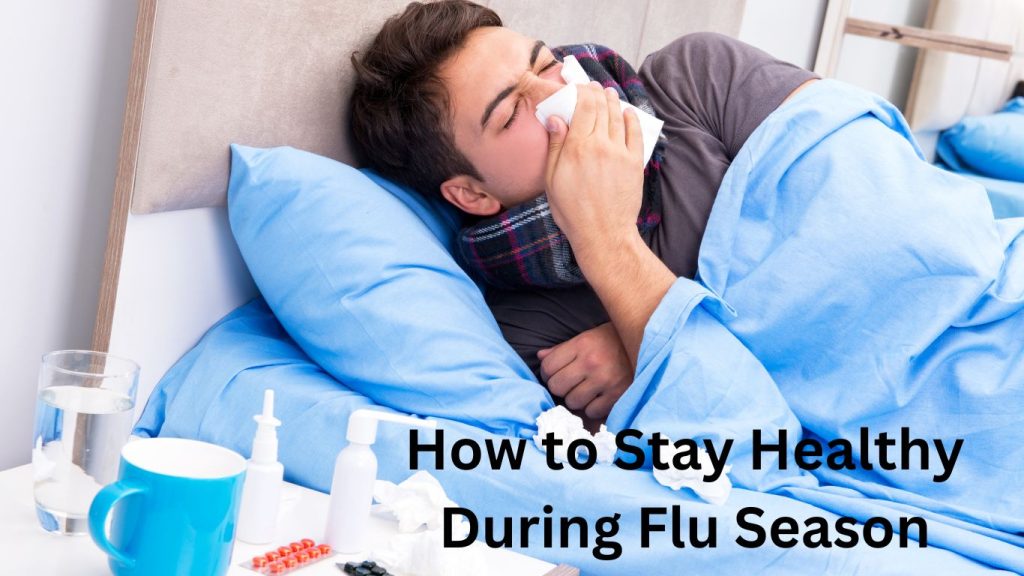How to Stay Healthy During Flu Season? To stay healthy during flu season, first prioritize vaccines and hygiene practices.
To stay healthy during flu season, you must first practice hygiene practices like handwashing and covering your mouth and nose when sneezing or coughing. This will help prevent the spread of germs and reduce the risk of contracting the flu.
In addition, getting enough sleep, eating a balanced diet, staying active, and managing stress can strengthen your immune system, minimize your chances of getting sick, and keep you healthier. Following these preventive measures and maintaining good health habits can protect yourself and others around you and help you Stay Healthy during flu season.

1. Understanding The Flu Season
As the days get shorter and the temperature drops, it’s time to gear up for flu season. The flu, also known as influenza, is a contagious respiratory illness caused by influenza viruses that infect the nose, throat, and sometimes the lungs. Understanding the flu season is crucial in taking appropriate measures to protect yourself and your loved ones. In this section, we will delve into what the flu season is, when it occurs, and why it is significant.
1.1 What Is The Flu Season?
The flu season is when the prevalence of influenza viruses is at its peak. Influenza viruses can be found year-round, but they are most active during the colder months, typically from October to May in the Northern Hemisphere. During this time, flu activity tends to increase due to various factors such as colder weather, closer proximity of people indoors, and holiday gatherings.
1.2 When Does The Flu Season Occur?
In the Northern Hemisphere, the flu season usually starts in October and peaks between December and February. However, it’s important to note that the timing and duration of the flu season can vary from year to year. It is influenced by factors such as the predominant strains of influenza viruses circulating, the effectiveness of flu vaccines, and the overall population susceptibility to the virus.
1.3 Why Is The Flu Season Significant?
The flu season demands our attention because influenza is highly contagious and can lead to severe complications, especially in vulnerable populations such as young children, older adults, and individuals with weakened immune systems. The flu can result in hospitalizations, pneumonia, and even death. Additionally, the flu can cause disruptions in daily life, including missed school or work days, reduced productivity, and increased healthcare costs.
By understanding the flu season, you can take proactive steps to protect yourself and minimize the impact of the flu. In the following sections, we will delve deeper into preventive measures, symptoms to watch out for, and effective strategies to stay healthy during this challenging time.
2. Preventive Measures To Stay Healthy
Learn how to stay healthy during flu season with these preventive measures. Follow these simple tips to protect yourself and others from the flu, including washing hands frequently, getting vaccinated, and practicing good hygiene habits.
Flu season can be challenging, but you can take several preventive measures to stay healthy. By following these simple steps, you can minimize your risk of getting sick and ensure you maintain optimal health throughout the season.
2.1 Get Vaccinated
Vaccination is one of the most effective ways to protect yourself against the flu. The flu vaccine is designed to stimulate your immune system and prepare it to fight against the flu virus. Vaccination not only reduces your chances of getting sick but also helps prevent the spread of the virus to others. Vaccination yearly is essential, as the flu virus often changes and new strains emerge. Schedule an appointment with your healthcare provider to get vaccinated immediately.
2.2 Practice Good Hygiene
Maintaining good hygiene habits is crucial for preventing the spread of flu and other viruses. Make it a habit to frequently wash your hands with soap and water for at least 20 seconds. If soap and water are not available, use an alcohol-based hand sanitizer. Avoid touching your face, especially your eyes, nose, and mouth, as these are common entry points for viruses. Clean and disinfect frequently touched surfaces, such as doorknobs, keyboards, and phones, regularly to eliminate any potential viruses.
2.3 Boost Your Immunity
A strong immune system can help protect you from the flu and other illnesses. Boost your immune system by maintaining a healthy lifestyle. Eat a balanced diet of fruits, vegetables, whole grains, and lean proteins. Stay hydrated by drinking plenty of water throughout the day. Engage in regular exercise to improve blood circulation and strengthen your immune system. Additionally, ensure you get enough sleep, as sleep deprivation can weaken your immune system and make you more susceptible to infections.
2.4 Stay Away From Sick Individuals
While it may not always be possible, try to avoid close contact with individuals who are sick to minimize your risk of catching the flu. If someone in your household is ill, encourage them to cover their mouth and nose when coughing or sneezing and to wash their hands frequently. If you must care for a sick individual, wear a face mask, and wash your hands thoroughly afterward. Practice social distancing and avoid crowded places during flu season to reduce your exposure to potential viruses.
2.5 Maintain A Healthy Lifestyle
Leading a healthy lifestyle is key to strengthening your immune system and staying healthy. Eat nutritious meals, avoid excessive alcohol consumption, and quit smoking if you’re a smoker. Get regular exercise to boost your overall health and immune system. Manage stress through relaxation techniques, such as meditation or deep breathing exercises. Prioritize self-care and ensure you’re taking care of your physical and mental well-being.
By implementing these preventive measures, you are taking proactive steps to protect yourself and those around you during flu season. Stay vigilant, practice good hygiene, and prioritize your health to minimize your risk of falling ill.
Learn more about Treatment for Osteoporosis in the main guide.
3. Effective Flu Season Strategies
3. Effective Flu Season Strategies
During flu season, it’s crucial to take proactive steps to stay healthy and avoid falling victim to the dreaded flu virus. Following these effective flu season strategies can significantly reduce your risk of getting sick and ensure a speedy recovery if you experience symptoms.
3.1 Stay Informed About Flu Symptoms
Being aware of the common symptoms of the flu allows you to catch it early and take necessary precautions to prevent the virus from spreading. Keep an eye out for symptoms such as:
- Fever
- Cough
- Sore throat
- Body aches
- Headache
- Fatigue
- Chills
- Nasal congestion
- Shortness of breath
3.2 Take Immediate Action If You Experience Symptoms
If you start experiencing flu-like symptoms, taking immediate action is important to prevent the virus from spreading further. Stay home and avoid close contact with others to minimize the risk of transmission. Make sure to cover your mouth and nose with a tissue or your elbow when coughing or sneezing to prevent the spread of droplets.
3.3 Follow the Doctor’s Advice And Take Prescribed Medication
When you suspect you have the flu, seeking medical advice and following your doctor’s recommendations is crucial. They may prescribe antiviral medications that can help shorten the duration and severity of the illness. Take the prescribed medication as directed, even if you start feeling better, to ensure a complete recovery.
3.4 Rest And Take Care Of Yourself
Rest is essential when fighting off the flu virus. Make sure to get plenty of sleep and avoid overexerting yourself. You can boost your immune system and heal more quickly by allowing your body to rest and recover.
3.5 Stay Hydrated And Nourished
Drinking plenty of fluids, preferably water, is vital when battling the flu. Fluids help prevent dehydration and flush out toxins from the body. Additionally, nourish your body with healthy foods rich in vitamins and minerals to support your immune system and aid recovery.
3.6 Monitor Flu Updates And Guidelines
To stay informed and up-to-date on the latest flu-related information, regularly check flu updates and guidelines provided by reliable sources such as the Centers for Disease Control and Prevention (CDC). These updates can help you make informed decisions about preventive measures and treatment options.
By following these effective flu season strategies, you can stay healthy, minimize the risk of getting the flu, and ensure a speedy recovery if you fall sick. Prioritize your health and well-being during the flu season to protect both yourself and those around you. Google Maps.
Frequently Asked Questions On How To Stay Healthy During Flu Season
How Do You Stay Healthy In The Flu Season?
To stay healthy during flu season, follow these tips: Get the flu vaccine. Wash your hands frequently with soap and water. Avoid close contact with sick people. Cover your mouth and nose with a tissue when coughing or sneezing.
– Practice good hygiene habits, like disinfecting commonly touched surfaces.
How Can You Be Safe During The Flu Season?
To stay safe during flu season, follow these guidelines: 1. Get vaccinated to protect yourself and others. 2. Wash your hands frequently with soap and water. 3. Avoid close contact with sick individuals. 4. Cover your mouth and nose when coughing or sneezing with a tissue or your elbow.
5. Clean and disinfect commonly touched surfaces regularly.
What Are 3 Actions You Can Take To Protect Against The Seasonal Flu?
Get vaccinated, wash your hands regularly, and avoid close contact with sick individuals to protect against the seasonal flu.
What Is The Best Thing For Seasonal Flu?
The best thing for seasonal flu is to get plenty of rest, drink fluids, and take over-the-counter medications like pain relievers and decongestants. It’s important to stay home, avoid contact with others, and follow the guidance of your healthcare provider.
Conclusion
To wrap up, maintaining good health during flu season is crucial for overall well-being. Regular handwashing, vaccination, and a balanced diet can significantly reduce the risk of catching the flu. Additionally, incorporating exercise and adequate rest into your routine will strengthen your immune system.
Stay healthy, stay safe, and protect yourself and others from flu-related illnesses.
